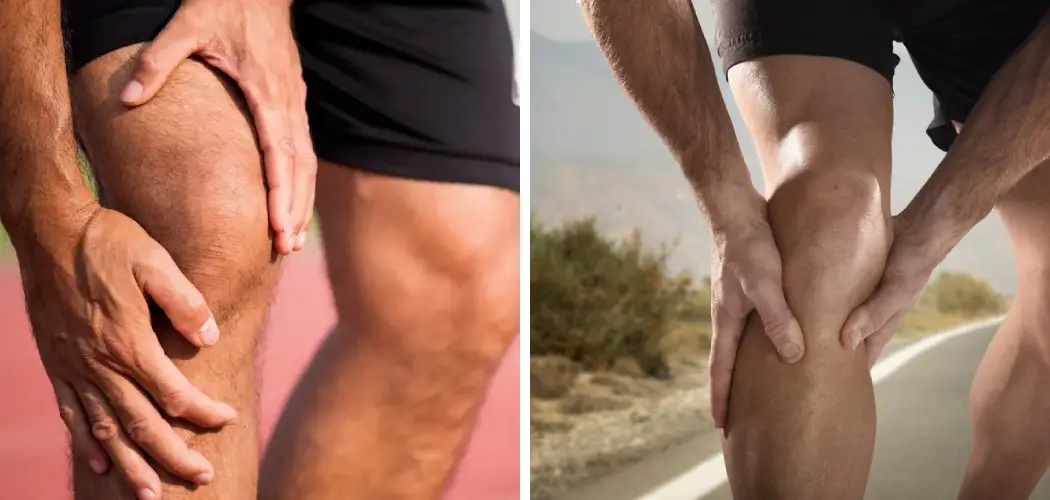If you experience knee pain, the first thing you may think is that your shoes are to blame. But can shoes cause knee pain? While it’s true that bad shoes can cause knee pain, it’s not always the root of the problem. In this post, we’ll explore some of the other causes of knee pain and what you can do to alleviate it. We’ll also look at some specific shoe recommendations for those with knee pain. Read on to learn more!
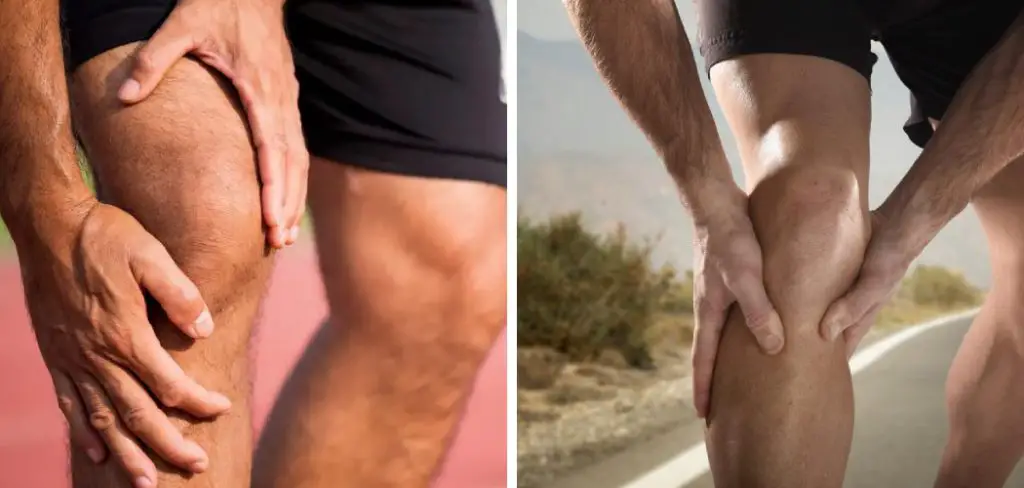
Why Do Shoes Cause Knee Pain?
Knee pain is a common problem that can be caused by a variety of factors, including age, injury, and arthritis. However, one of the most surprising causes of knee pain is footwear. That’s right – your shoes can be contributing to your knee pain.
This is because shoes can throw off the alignment of your knees, ankles, and hips, putting extra stress on the joints. This can lead to a condition known as patellofemoral pain syndrome, which can cause both short-term and long-term knee pain.
10 Ways the Wrong Shoes Can Affect Your Knees
1. Collapsed Arches
When your shoes don’t support the natural arch of your foot, it can cause a condition called “fallen arches” or “flat feet. “This can lead to tendonitis in your ankle and knee pain in the long run. Make sure your shoes provide enough arch support to avoid this issue. It may be helpful to visit a podiatrist for custom orthotics if you have flat feet.
2. High Impact
When it comes to whether shoes cause knee pain, high-impact activities are some of the worst offenders. Running, jumping, and other high-impact cardio can put a lot of stress on the knees. Over time, this can lead to inflammation, pain, and even injuries. If you’re struggling with knee pain, it’s best to avoid high-impact activities or take measures to reduce the impact (such as running on softer surfaces).
3. Instability
The third way shoes can contribute to knee pain is by causing instability. This can happen in several ways. For example, if the shoes are too loose, they can cause the feet to slide around inside them, putting stress on the knees and leading to pain. Additionally, shoes that are too high can also cause instability, as they can make it difficult to keep your balance.
This can lead to falls and injuries, which can, in turn, cause knee pain. Finally, shoes with a lot of cushioning can also be unstable, as they can make it difficult to feel the ground and cause you to lose your balance. All of these factors can contribute to knee pain, so it is important to be aware of them when choosing shoes.
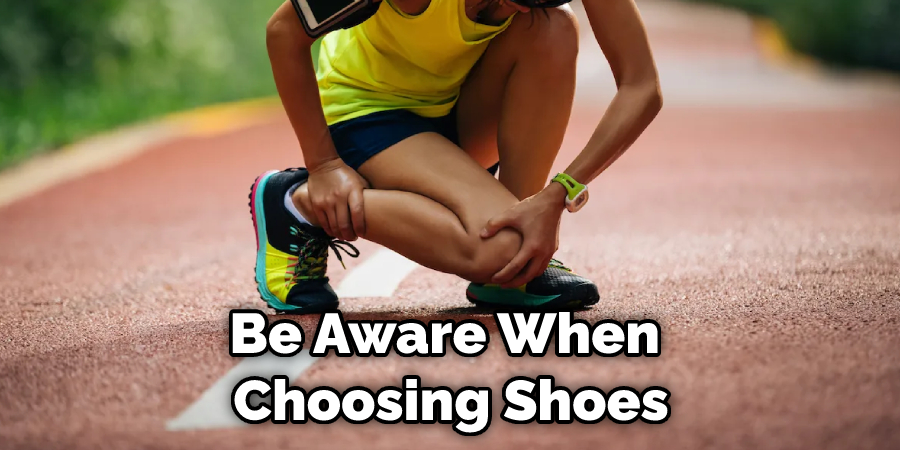
4. Lower Body Fatigue
One of the most common causes of knee pain is lower body fatigue. This can be caused by several things, including poor circulation, dehydration, and overuse. If you find that your knees are constantly tired and achy, it may be time to invest in a new pair of shoes. Additionally, stay hydrated and take breaks often to avoid overexerting yourself. This will help keep your lower body strong and prevent knee pain.
5. Misalignment
When your feet are misaligned, it can cause problems up the kinetic chain. One common issue is knee pain. This can be caused by wearing shoes that don’t provide proper support or having an underlying condition like bunions or hammertoes. If you suspect your shoes are to blame for your knee pain, visit a podiatrist or other medical professional to get a proper diagnosis. It may be as simple as switching to a different style of shoe or adding some orthotics for additional support.
6. Poor Quality Shoes
Wearing poor-quality shoes can also lead to knee pain. They often don’t provide the necessary support and cushioning to protect your joints. If you’re going to be on your feet all day, it’s important to invest in a good pair of shoes. Otherwise, you may be putting yourself at risk for knee pain and other injuries. Remember, good shoes are an investment in your health and well-being. Don’t skimp on quality!
7. Overpronation
When your feet roll inward more than they should when you walk or run, it can cause knee pain. This is because the pressure isn’t evenly distributed and puts extra stress on the inside of your knees. Wearing shoes that are meant to stabilize your feet can help. Additionally, exercises that strengthen your feet and ankles can also help prevent overpronation.
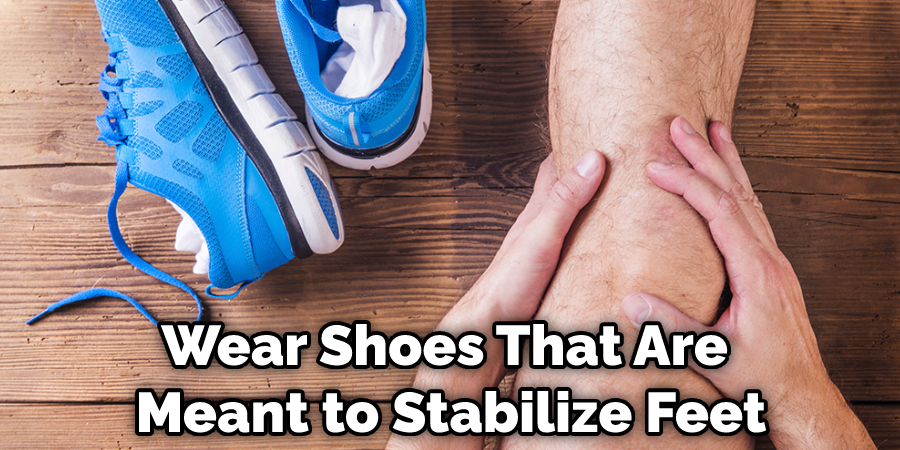
8. Shortened Gait
If you can’t walk properly in your shoes, you may start to experience knee pain. This is because you’re not distributing your weight evenly, and your knees have to absorb the brunt of the pressure. Wearing shoes that fit well can help prevent this type of pain. If you have a hard time finding shoes that fit, consider getting custom-made orthotics from a podiatrist.
9. Poor Arch Support
Flat feet can cause knee pain because the foot’s arch doesn’t distribute weight evenly, causing undue stress on the ankles, knees, and hips. Poorly supported arches can also cause the calf muscles to overcompensate and become tight, leading to further knee pain. Wearing shoes with good arch support can help alleviate this issue. Additionally, doing exercises that strengthen the arches can also help prevent knee pain.
10. Tendon Strain
The connective tissue joining your muscles to your bones can be overworked and strained. This can happen with sudden or repetitive motion, such as when you change direction quickly while running. Symptoms include pain, swelling, and bruising around the affected area.
Knee pain is a common issue that can be caused by various factors. Wearing the wrong shoes is one of the most common, as they can cause several problems. From instability to misalignment, there are many ways that your shoes can contribute to knee pain. Choosing the right shoes can help prevent this type of pain.

Lower body fatigue, poor circulation, and dehydration can also lead to knee pain. Make sure to take breaks often and stay hydrated to avoid these issues. If you suspect your shoes are causing your knee pain, visit a podiatrist or other medical professional to get a proper diagnosis. Keep reading for more information about can shoes cause knee pain.
Impact of Different Shoes on Your Knees
Different shoes can have different effects on your knees. For example, high heels can cause more strain on the knee joint than lower heels or flats. This is because high heels change the way you walk, putting more pressure on the front of the knee. This can eventually lead to pain in the knee joint and even osteoarthritis.
Here are some other reasons:
High-Heeled Shoes
Wearing high heels can put extra stress on your knees and lead to knee pain. If you must wear high heels, try to limit your time on them and avoid wearing them every day.
Walking or Running Shoes
If you don’t wear the proper shoes while walking or running, it can stress your knees. This can lead to pain and other issues such as patellofemoral pain syndrome, iliotibial band syndrome, and patellar tendinitis.
Choose shoes that fit properly and provide support for your feet. Replace your shoes when they start to wear out. If you have any injuries or medical conditions, talk to your doctor before starting a new exercise routine.
Rigid vs. Flexible Shoes
There are two main types of shoes for their flexibility – rigid and flexible. Each type has its pros and cons when it comes to knee pain.
Rigid shoes are generally made of materials like leather or vinyl. As a result, they’re less likely to absorb shock, protecting your knees from impact-related injuries.
Flexible shoes are often made of materials like mesh or fabric. As a result, they’re more likely to absorb shock, which can protect your knees from impact-related injuries.
Flat Shoes
Another factor to consider when choosing shoes is the heel. Many shoes have a raised heel, putting extra stress on the knees. Wearing flats or shoes with a lower heel can help take some pressure off your knees.
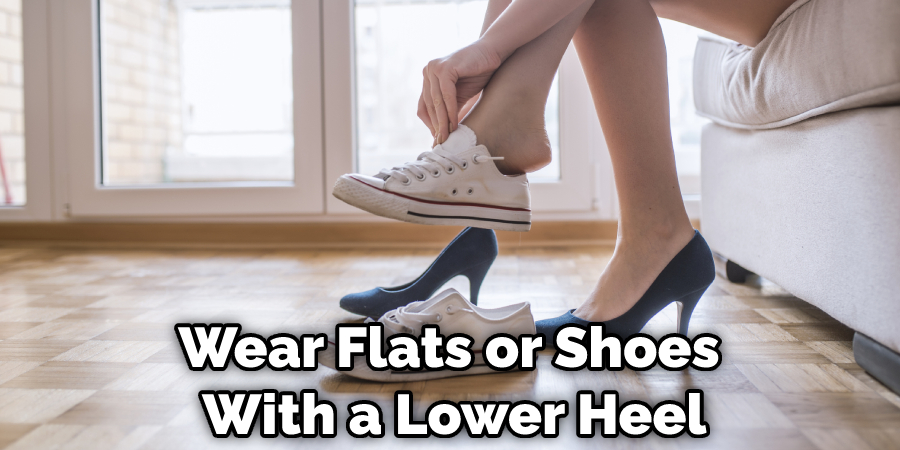
Choosing Shoes that Support Your Knees
For many of us, knee pain is a daily struggle. The causes can be varied, ranging from degenerative conditions to traumatic injuries. However, one often overlooked factor in knee pain is the type of shoes you wear. Unlike other joints in the body, the knees are designed to bear a great deal of weight. As a result, they are especially susceptible to injury if not properly supported.
When choosing shoes, always look for a pair that offers good arch support and cushions your heel. Avoid high heels and pointy toes, as these can place undue stress on the knees. Additionally, be sure to choose a shoe that is the right size. Wearing too tight or too loose shoes can lead to joint instability and increase your risk of knee pain.
What Are the Main Causes of Knee Pain?
There are several different reasons why someone might experience knee pain. One of the most common causes is arthritis, which can lead to inflammation and stiffness in the joints. Another common cause is a dislocation or fracture, which can occur after a fall or other accident.
Additionally, knee pain can be caused by tendinitis, bursitis, or meniscus tears. The pain may be due to an underlying medical condition such as gout or lupus. Knee pain can also result from overweight or obesity, as excess weight puts additional strain on the joints.
Can Shoes Cause Knee Pain?
Wearing the wrong shoes can cause knee pain in several ways. First, ill-fitting shoes can strain the muscles and tendons around the knee, causing inflammation and pain. Second, shoes that are too stiff or too loose can throw off your balance, putting unnecessary stress on the joints.
Third, high heels can change the way you walk, putting added strain on the knees. And finally, worn-out shoes may not provide enough support or cushioning, leading to knee pain again. So, if you’re suffering from knee pain, it’s worth taking a closer look at your shoes. Make sure they fit properly, offer adequate support, and often replace them to avoid wear and tear.
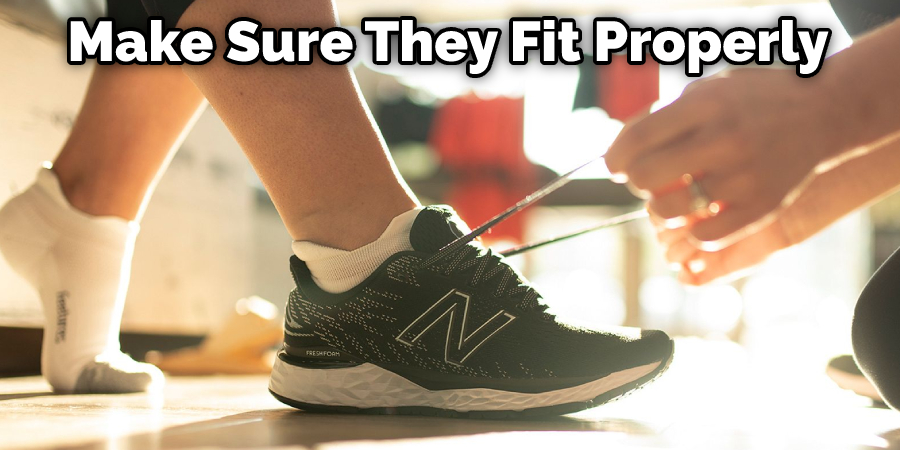
What Are Some Tips for Preventing Knee Pain?
1. Wear supportive shoes that fit well and provide adequate cushioning.
2. Avoid high-impact activities if you’re at risk for knee pain.
3. Strengthen the muscles around your knees with exercises like squats and lunges.
4. Stretch regularly to keep your muscles flexible and reduce your risk of injury.
5. Stay hydrated and maintain a healthy weight to reduce stress on your knees.
Can Shoe Inserts Help with Knee Pain?
If you suffer from knee pain, you are not alone. In fact, according to the American Academy of Orthopaedic Surgeons, knee pain is one of the most common complaints that they see. While there are a variety of possible causes, such as arthritis or an injury, often, the pain can be traced back to improper alignment.
When your knees are not properly aligned, it puts additional stress on the joints, leading to pain. One way to help alleviate this pain is by wearing shoe inserts.
By providing support and cushioning for the foot, inserts can help to reduce stress on the knees and improve alignment. In turn, this can help to reduce or eliminate knee pain. If you are suffering from knee pain, talk to your doctor about whether shoe inserts may be right for you.
While shoe inserts can be a helpful tool in the fight against knee pain, it is important to remember that they are not a cure-all. In some cases, additional treatments, such as physical therapy, may be necessary to address the issue fully. If you want to know more about can shoes cause knee pain? Keep reading!
Are There Any Other Ways to Prevent Knee Pain?
Knee pain is a common problem, especially among older adults. However, there are several things that you can do to help prevent knee pain. First, make sure that you are using proper techniques when you exercise. For example, when lifting weights, be sure to use your thighs and buttocks to support the weight rather than your knees.
Second, try to maintain a healthy weight. Excess pounds put extra stress on your knees, leading to pain. Third, avoid unnecessary stress on your knees, such as running on hard surfaces or playing contact sports without proper protective gear. By following these simple tips, you can help prevent knee pain and keep your joints healthy.
You Can Check It Out to Can New Shoes Cause Calf Pain
Frequently Asked Question
Q: Do Good Shoes Help Knee Pain?
A: There is no definitive answer to this question as it can depend on various factors, such as the type of shoes you are wearing, how often you wear them, and your biomechanics. However, in general, good shoes can help to alleviate knee pain by providing proper support and cushioning.
Q: Can Too Much Arch Support Cause Knee Pain?
A: There is some evidence that suggests that too much arch support can cause knee pain. This is because when the arch is overly supported, the foot muscles can weaken, leading to problems with the knee. If you are experiencing knee pain, it may be helpful to try going without arch support for a while and see if that helps. Consulting with a podiatrist or other medical professional is also recommended.
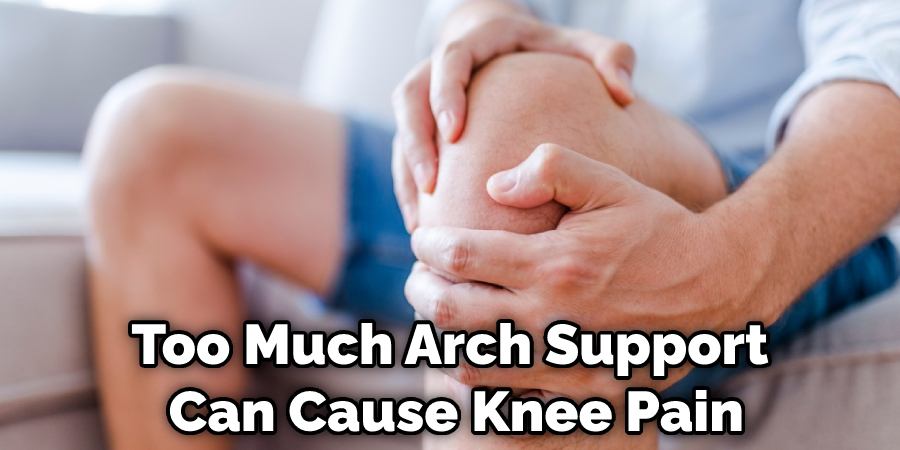
Q: How Can I Tell if My Shoes Are Causing Knee Pain?
A: If you are experiencing knee pain, it is important to pay attention to your body and how it feels when you wear different types of shoes. You may also want to consult with a medical professional for a proper diagnosis and treatment plan. Additionally, be sure to check the fit and support of your shoes regularly and replace them when necessary.
Q: Can Orthotics Help Knee Pain?
A: Yes, orthotic inserts can help alleviate knee pain by providing proper support and alignment for the feet. However, it is important to consult with a medical professional before using them to ensure they are right for your specific condition. In some cases, physical therapy or other treatments may be necessary in combination with orthotics to fully address knee pain.
Conclusion
While it’s not entirely clear how shoes cause knee pain, the study does show a correlation between wearing certain types of shoes and an increase in knee pain. If you’re experiencing knee pain, it might be worth considering switching to a different type of shoe. Until we know more about why shoes seem to cause knee pain, it’s best to play it safe and avoid overly restrictive or high-heeled shoes whenever possible. Have you ever experienced knee pain after wearing certain types of shoes? Let us know in the comments! Thanks for reading our post about can shoes cause knee pain.
You May Also Read: Best Slippers for Back Pain

